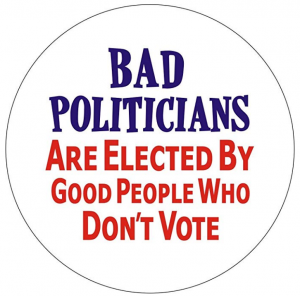by George Kennedy
Two of the most vexing issues for Republicans and Democrats in the 2020 election are structural inequality (economic and health care issues, controlling the cost of prescription drugs, protecting the ACA) and the lack of income mobility. There are other important issues but, these two issues ignited passions on both sides of the political divide and they could connect voters to the elections in 2020, perhaps on par with 2008 – as a point of reference. Unarguably, every American of voting age, especially within the middle class, is invested in the outcome of the 2020 elections because there is more at stake than just the re-election or election of a President. This next national election is about the future of this country as we know it, or we thought we knew it. This is not hyperbole; this is a fact, a daily reality for all of us. Events since the 2016 elections validate my point.
So what are the stakes? Here is the future as seen by the one-percent and their preferred candidate, Donald Trump. They believe they are close to enshrining the idea that massive inequality and exploitation of people was just the price you pay for progress. This belief is cancerous at its core, but it is pervasive among the Republicans on Capitol Hill. Conservatives are mounting an aggressive campaign to retain in place a White House occupant and a Senate that reinforces this idea. What is scary is they are close, which is why the President says we cannot fail to re-elect him.
What the one-percent and the conservatives fail to grasp, however, is this: the harder they pushback against the 99-percent, the greater the leverage they confer upon the forces for change. Witness the outcome of the 2018 mid-terms and several recent gubernatorial elections. Their pushback is uniting independents, communities of color, Democrats and women – the rest of us. These are the real stakes in the 2020 elections. Should the one-percent prevail, it would take nothing short of massive civil unrest to reverse this outcome, and even then change could not be achieved immediately.
I would venture that most Americans know this country is perched precariously at the edge of a dark and undesirable future as Democrats and Republicans glare at each other across an abyss and trade accusations. We know that the forces of the super-rich and the radical conservatives who brought us contemporary America are determined to abolish our social safety net and refashion this country so that it more closely resembles America of the 18th century, when birthright, wealth, and race determined your place in society and, largely, your future.
For more than two centuries, including a bloody civil war and other struggles for equality, Americans have striven until recently, albeit haltingly, to perfect their democracy and to share it with the world. Its proudest achievement was the creation of a strong, integrated, and vibrant middle class. In large measure, this country has been successful – the ultimate testament to what has been the most successful democracy ever. My point is, that proud history no longer speaks to the future most Americans desire.
The most powerful weapon we have is our right to vote. The enemies of the majority know this, which is why the one-percent generously finances the election of public officials whose primary objective is to preserve the idea of the one-percent’s right to rule. If this country is to restore public accountability, it has to be now. Most Americans are increasingly aware that their interests are no longer represented by many of their elected officials, particularly in many statehouses and in the U.S. Congress. This development is as direct a threat to democracy as the 1941 attack on Pearl Harbor. Our national response then was immediate, coordinated, and effective.
The weapons chosen to fight this new danger have to have real deterrent value: the ballot box, the U.S. Constitution, and the vigilance of the rest of us. Those who are disappointed in President Trump are justified in their disappointment because the Republican Party has been captured by the capricious whims of a single individual. We have to weigh inaction on our part against its probable effect on the future. This is still the good ship America, and our obligations to defend it extend through the ballot box. Then there is the U.S. Constitution.
Senator Bernie Sanders (I.-VT) and other Members of Congress, urge Americans to support a constitutional amendment to reverse the Supreme Court’s infamous 5-to-4 decision in the Citizens United case. They are on to something here, even as cumbersome as the process will be. The deterrent value of an amendment that would be anathema to the interests of the one-percent cannot be underestimated. Constitutional amendments are serious business and, in this instance, merit the full consideration of every American who calls this country home. If you believe in your birthright, if you anchor your future in what you hope will be the promise this country offered generations past, you would vote for change. You will support aggressive citizen protests, and you will become an intellectually armed and dangerous advocate for a different tomorrow – vastly different than the future proffered by the one-percent. Money cannot buy this kind of opponent. Money buys those of weak character, who are self-directed, and addicted to wielding power over others.
Also at stake are the consequences of the vote. Only we can return value to the ballot. A simple, expedient way to select candidates for the House and Senate is a litmus test. Serious candidates would pledge in writing to support an amendment to rescind the status of personhood for corporations. If candidates were willing to sign a “no new taxes” pledge for Grover Norquist, why not a pledge that actually restores legitimacy to the vote?
The one-percent know the linchpin to the success of either side in this struggle for control is the vote. Their surrogates at the state level have chosen aggressive and selective disenfranchisement as the preferred approach to neutralize the probable impact of the votes cast by communities of color, students, the elderly, and the poor. This is another tactic that reaps great dividends. It did in 2016.
Through the omnipresence of FOX News, persuade a community of loyalists that progressives have invented the problems of concern to them. Convince them that their ideals and vision of America will be best served by continued loyalty to a slate of issues and a platform of candidates supported by the far right. Persuade enough people to vote against their own interests and you have laid the foundation for American Fascism.
Only the ballot threatens a change in Washington, and voters have to intend consequence to ignoring their vote while giving a voice to that threat. Bear in mind, members of the one-percent enter the voting booth as everyone else does: individually. Their numbers are magnified only when they purchase the allegiance of candidates whom the voters elect. The American people must elect those who will remain connected to their voters. There are candidates with real integrity out there. Their big problem is they cannot compete against candidates financed by big SuperPac money. Take the power from expensive and misleading campaign ads and you will elect officials who respect the voters and the power of the ballot box more than the financial contributions from the one-percent. It is as simple as that.
After the nominee of the one-percent has been defeated next November, only the first phase of our commitment to change will have been completed. The real work follows immediately thereafter when the White House and the Congress have to set about the process of actually governing on our behalf. Success will require the sustained vigilance of the rest of us – the 99-percent.







